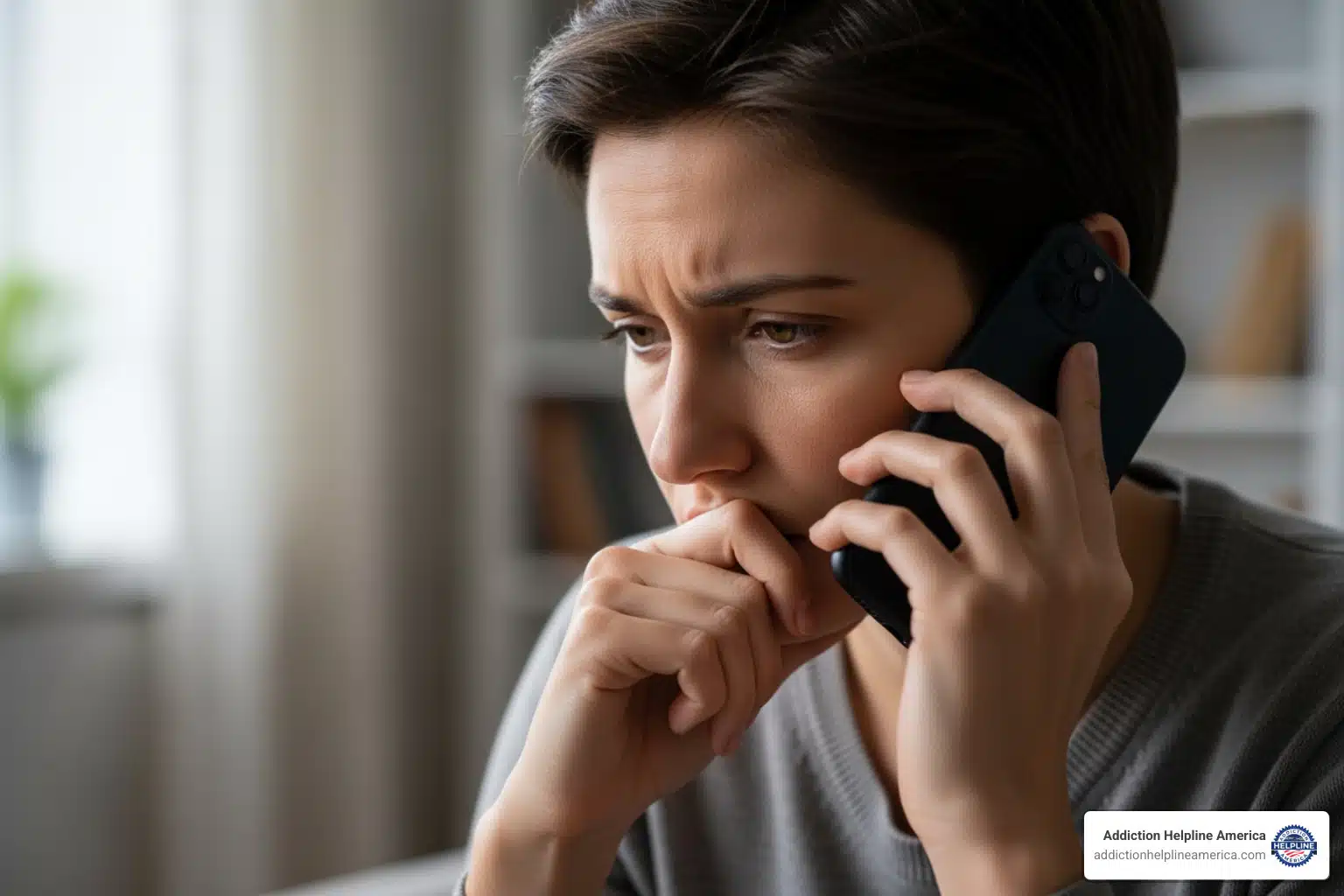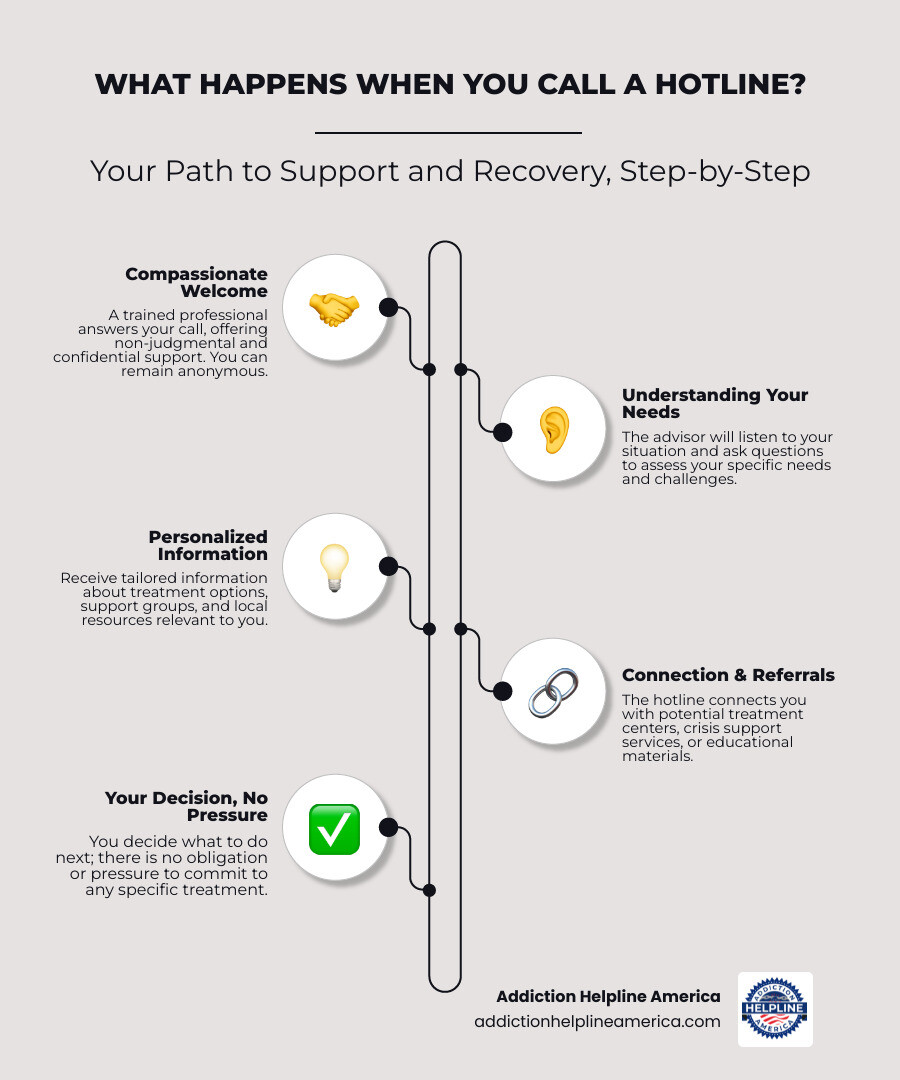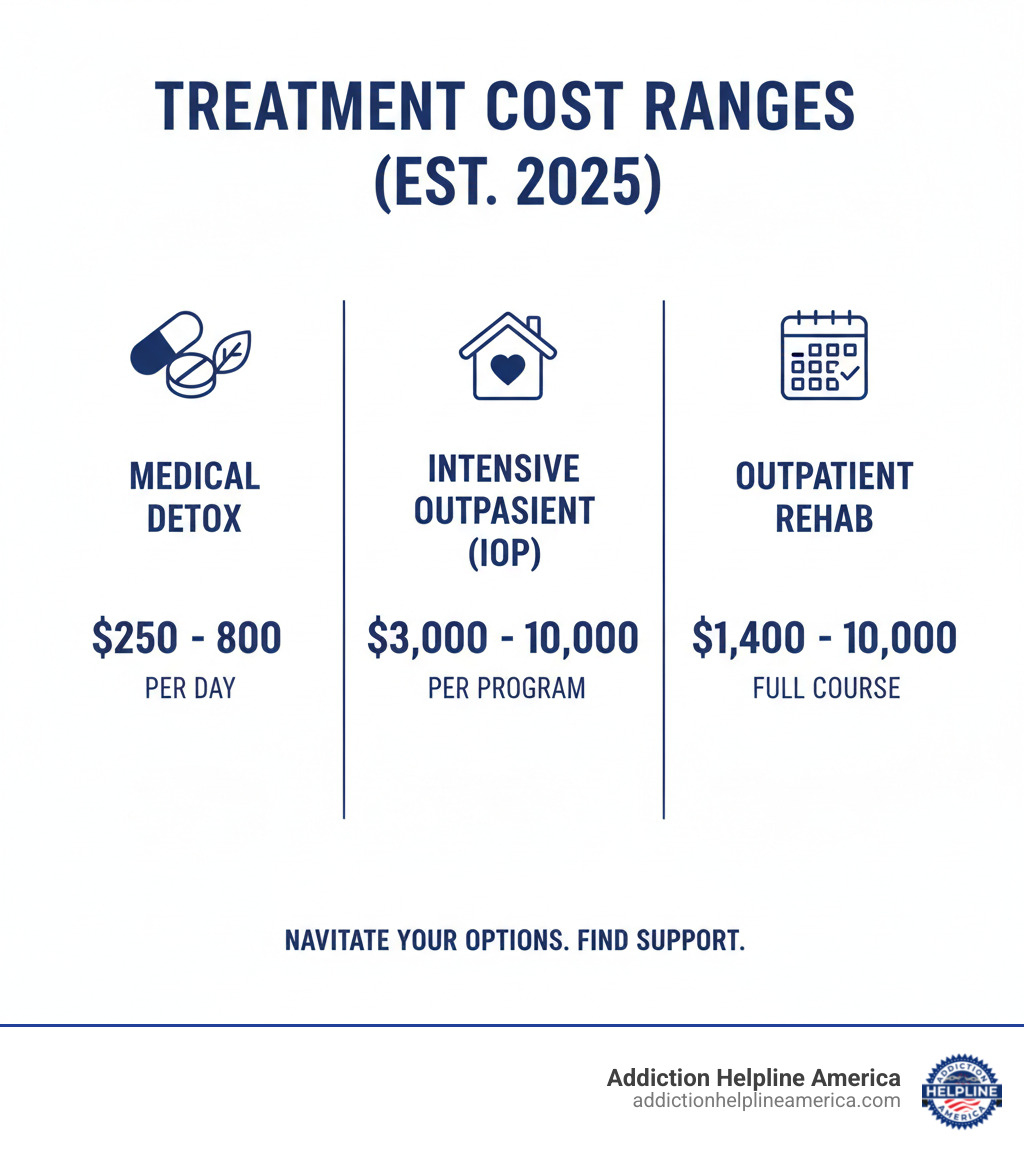
Why Reaching Out for Help Can Save Your Life
National Drug Abuse Hotline Numbers: Free Addiction Help 24/7 are confidential, toll-free services connecting you with trained professionals for immediate support, treatment information, and local referrals—all at no cost or obligation.
Quick Access to Help:
| Hotline | Number | Services | Hours |
|---|---|---|---|
| National treatment referral helpline (federal) | 1-800-662-4357 | Treatment referrals, support groups, community resources | 24/7/365 |
| National suicide & crisis lifeline | 988 | Crisis support, mental health help, addiction guidance | 24/7/365 |
| Addiction Helpline America | See website | Treatment options, insurance verification, personalized support | 24/7/365 |
| 24/7 crisis text support | Text HOME to 741741 | Text-based crisis support | 24/7/365 |
The statistics are staggering: in 2022, nearly 49 million Americans had a substance use disorder, yet only 1 in 4 who needed help received it at a specialty facility. If you or a loved one are part of these numbers, you may feel overwhelmed and unsure where to turn. The good news is that recovery is possible, and help is just a phone call away.
Taking that first step can feel impossible, but hotlines are staffed by caring professionals who understand addiction, offer guidance without judgment, and can connect you to the help you need. One caller’s husband, after years of struggling with alcohol, found the right treatment through a helpline and has now been sober for 18 months.
At Addiction Helpline America, we connect individuals and families with resources to find their path to recovery. Our team provides compassionate, confidential support to help you take that crucial first step toward healing.
What Are Drug Abuse Hotlines and How Do They Help?
When you’re struggling with addiction, a National Drug Abuse Hotline Numbers: Free Addiction Help 24/7 can be a lifeline. These toll-free phone numbers are staffed by trained professionals who offer compassionate support without judgment or pressure.
Key benefits of these hotlines include:
- Free and Confidential: You can speak openly without worrying about cost or privacy. Many allow you to remain anonymous.
- 24/7/365 Availability: Addiction doesn’t follow a 9-to-5 schedule, and neither does support. Help is available any time, day or night.
- Information and Referrals: Advisors provide information on treatment options and connect you with local facilities and support groups that fit your needs.
- Immediate Crisis Intervention: Specialists can help you through overwhelming or dangerous moments and connect you with emergency resources if necessary.
- Emotional Support: Sometimes, you just need someone to listen. Feeling heard by a caring, non-judgmental person can be incredibly powerful.
Calling a hotline doesn’t obligate you to enter treatment. You are simply gathering information and exploring options, remaining in control of your journey. Reaching out is an act of strength. For more guidance, visit our page on reaching out for help.
When to Call a Hotline: Recognizing the Signs
Knowing when to call can be difficult. Here are common signs that it’s time to reach out to a National Drug Abuse Hotline Numbers: Free Addiction Help 24/7 for yourself or a loved one.
- Behavioral Changes: Increased secrecy, dishonesty, abandoning old friends for new ones centered around substance use, or taking risks to get drugs or alcohol.
- Physical Symptoms: Unexplained weight changes, poor hygiene, bloodshot eyes, unusual energy levels (high or low), tremors, or pupils that are larger or smaller than normal.
- Neglecting Responsibilities: Missing work or school, failing to meet obligations, and experiencing financial difficulties like unpaid bills or borrowing money to fund the habit.
- Relationship Problems: Frequent arguments with family and friends, social isolation, and prioritizing the substance over loved ones.
- Inability to Control Use: Wanting to stop but feeling unable to, experiencing intense cravings, needing more of the substance for the same effect (tolerance), and having painful withdrawal symptoms when trying to quit.
If these signs are familiar, don’t wait. A hotline can help you understand what’s happening and what your options are. Understanding addiction triggers can also provide valuable insight. You don’t need a plan; you just need to make the call.
Key National Drug Abuse Hotline Numbers: Free Addiction Help 24/7
When you need help, having a trusted list of resources is crucial. Here are reliable National Drug Abuse Hotline Numbers: Free Addiction Help 24/7 that offer immediate, confidential support from government-sponsored and nonprofit organizations.
For general education about addiction and recovery, visit the National Institute on Drug Abuse, a leading federal agency providing science-based information on drug use and addiction.
- Federal treatment referral helpline (English/Spanish): Call 1-800-662-HELP (4357) for 24/7 confidential information and referrals.
- National suicide & crisis lifeline: Call or text 988 for 24/7 support for mental health crises and substance use struggles, with specialized options for veterans, Spanish speakers, and LGBTQ+ individuals.
- Disaster distress counseling line: Call 1-800-985-5990 for crisis counseling related to natural disasters or traumatic events.
- Peer mental health helpline: Call 1-800-950-6264 or text “Helpline” to 62640 for guidance on co-occurring mental health conditions.
- Youth and family support line: Call 1-800-448-3000; a TDD line is available at 1-800-448-1833.
- 12-step meeting locator (NA): Call 818-773-9999 x 771 to find local meetings for long-term, peer-led recovery support.
Finding Free Addiction Help 24/7: National Drug Abuse Hotline Numbers
At Addiction Helpline America, we simplify the process of finding help. We provide 24/7 confidential support and personalized guidance to connect you with the right program from our network of recovery centers. We listen and present options that fit your needs without pressure. Visit our Addiction Helpline America hotline information page to learn more.
For those who prefer not to call, text and chat options are available. Text your zip code to 435748 for a federal treatment referral by text, or text HOME to 741741 to connect with a 24/7 crisis text option.
Specialized Hotlines for Specific Needs
Addiction affects communities differently. These options provide custom support:
- Veterans and families: Dial 988, then press 1, or text 838255 to connect with responders familiar with military culture.
- LGBTQ+ peer support: Call 1-888-843-4564 for confidential, community-specific support and resources.
- Family support for a loved one’s drinking: Call 800-356-9996 for connections to counselors and group resources.
For co-occurring disorders, 988 and peer helplines can be vital. Explore our mental health support resources for more information.
What to Expect When You Call a Hotline
Picking up the phone to call a National Drug Abuse Hotline Numbers: Free Addiction Help 24/7 takes courage. Knowing the process can ease anxiety and help you feel more prepared.
You’ll be connected with a trained, compassionate advisor, many of whom have personal experience with recovery. They are there to listen and guide you without judgment. The entire conversation is confidential, and you can remain anonymous.
A typical call involves a warm greeting, followed by gentle questions to understand your situation: who the call is for, the substance involved, and any immediate safety concerns. This is also your time to ask questions about treatment, insurance, or how to help a loved one. Based on the conversation, the advisor will share information and discuss potential paths forward, such as treatment options and referrals. For more on the treatment process, see our page on what to expect in rehab.
Most importantly, there is absolutely no pressure to commit to treatment. The goal is to empower you with information so you can make the best choice for yourself or your loved one when you’re ready.
How to Prepare for Your Call
While you don’t need to have everything figured out, having some information ready can help the advisor provide the best guidance.
- Your Situation: Think about what prompted you to call. Are you concerned about yourself or someone else? What are the immediate challenges?
- Substance Use History: If you’re comfortable, share which substances are involved, for how long, and if there have been previous attempts to quit.
- Co-occurring Conditions: Mention any mental health conditions like anxiety, depression, or PTSD, as this helps in finding programs that treat both issues.
- Insurance Information (Optional): Having your provider’s name and policy number can speed up coverage verification, but it’s not required for the initial call.
- Your Questions: Jot down questions you have. Common topics include signs of overdose, treatment costs, different types of rehab, and how to support a loved one.
What Happens After the Call?
The call is just the beginning. The advisor will help you identify concrete next steps based on your needs.
This may include:
- Referrals to treatment centers (inpatient, outpatient, detox) that match your needs.
- Information on support groups like Alcoholics Anonymous (AA) or Narcotics Anonymous (NA).
- Connections to local resources such as mental health services or community support organizations.
- Guidance on creating a safety plan to prepare for challenging moments.
The advisor will outline the next steps in a manageable way. Recovery is a journey, not a race. Understanding the science behind addiction can also be helpful; learn more in our article on how the brain is affected by drug addiction. A single call can be the turning point where hope returns.
From Hotline to Hope: Finding Treatment and Managing Costs
After calling a National Drug Abuse Hotline Numbers: Free Addiction Help 24/7, the next step is exploring treatment. Navigating options and costs can seem daunting, but hotlines are designed to help bridge this gap.
Hotlines can connect you to treatment by helping you verify insurance, discuss payment options, find state-funded programs, or locate facilities with sliding scale fees.
Types of Addiction Treatment
Effective treatment is rarely one-size-fits-all. Hotlines can guide you through evidence-based options to find the right fit.
- Medical Detoxification (Detox): The first step for many, safely managing withdrawal symptoms under medical supervision.
- Inpatient/Residential Treatment: Living at a facility 24/7 for immersive, structured care away from triggers, typically for 30, 60, or 90 days.
- Outpatient Programs (PHP/IOP): Attending treatment sessions during the day while living at home. Programs vary in intensity from partial hospitalization (PHP) to intensive outpatient (IOP) and standard outpatient.
- Behavioral Therapies: Core treatments like Cognitive Behavioral Therapy (CBT) and Dialectical Behavior Therapy (DBT) help change negative thought patterns and behaviors.
- Medication-Assisted Treatment (MAT): Combines FDA-approved medications with counseling, effective for opioid and alcohol use disorders.
- Dual Diagnosis Treatment: Addresses co-occurring mental health disorders alongside addiction, which is crucial for lasting recovery.
Hotlines can help you find facilities offering the specific care you need. For a deeper dive, consult our guide to treatment approaches.
Understanding Treatment Costs and Payment Options
Cost is a major concern, but help is available regardless of your financial situation. Hotlines provide invaluable assistance in navigating these expenses.
While costs can range from a few thousand dollars for outpatient care to tens of thousands for residential treatment, several payment avenues exist:
- Insurance Coverage: Most health plans cover substance use disorder treatment. Hotlines can help you verify your benefits.
- Private Pay: Paying out-of-pocket for services.
- Financing Options: Many centers offer payment plans or work with third-party lenders.
- Scholarships and Grants: Non-profits and some facilities offer financial aid.
- State-Funded Programs: Hotlines can connect you to free or low-cost government-funded treatment.
Don’t let cost be a barrier. Hotlines can help you explore all options. For more on alcohol treatment, see our page on alcohol addiction rehab centers.
Frequently Asked Questions about Addiction Hotlines
It’s natural to have questions before calling a National Drug Abuse Hotline Numbers: Free Addiction Help 24/7. Here are answers to the most common concerns.
Can I call a hotline for a friend or family member?
Yes, absolutely. Many calls come from concerned loved ones. Hotline advisors can help you understand the signs of addiction, offer strategies on how to approach the person, and connect you with treatment options for them.
Crucially, they can also direct you to support for yourself, such as Al-Anon or Nar-Anon groups. Caring for someone with an addiction takes an emotional toll, and you need support too. When calling, provide as much information as you can to get the most personalized guidance. For more, explore our family support resources.
Are addiction hotline calls truly confidential?
Yes, calls to reputable hotlines are confidential. Your privacy is protected by laws like HIPAA (Health Insurance Portability and Accountability Act), and you can choose to remain completely anonymous. Hotlines do not require identifying information, though a zip code can help them find local resources.
The only exception is rare situations involving imminent danger to yourself or others, or cases of child abuse, where advisors are legally required to report for safety reasons.
Are there alternatives to calling, like texting or online chat?
Yes. If calling isn’t comfortable or possible, many services offer text and online chat options. These provide the same confidential support with added discretion and are essential for individuals who are deaf or hard of hearing.
Here are some key alternatives:
- 24/7 crisis text option: Text HOME to 741741 to connect with a crisis counselor.
- Federal referral by text: Text your zip code to 435748 to receive local treatment referrals.
- TDD services: A dedicated line is available for those with hearing or speech impairments at 1-800-448-1833.
Many organizations also have live chat features on their websites. Help is available in the format that works best for you.
Conclusion: Your First Step to a New Beginning
If you’ve read this far, you’ve already taken a courageous step by seeking information. We’ve covered how National Drug Abuse Hotline Numbers: Free Addiction Help 24/7 work, when to call, and how they connect you to life-changing support.
The most important thing to remember is that reaching out for help is an act of profound strength, not weakness. That single phone call can be the turning point for you or someone you love.
Recovery is possible. Millions of people live this reality, and every one of them started with a first step, just like the one you’re considering now. The path isn’t always easy, but with the right guidance, healing happens.
At Addiction Helpline America, we are here to simplify the process. Our compassionate specialists are available 24/7 to listen without judgment and connect you with quality treatment options from our nationwide network. You don’t have to do this alone.
Help is available right now. There’s no pressure, no obligation, and no judgment—just caring professionals ready to help you find your way forward. Your new beginning can start today.
For comprehensive information and to connect with our team, visit our addiction and rehab hotlines page. We’re here and ready to help.
Our helpline is 100%
free & confidential
If you or someone you care about is struggling with drug or alcohol addiction, we can help you explore your recovery options. Don’t face this challenge alone—seek support from us.
Programs
Resources
Will my insurance
cover addiction
treatment?
We're ready to help
Find the best
drug or alcohol treatment
center
Are you or a loved one struggling with addiction? Call today to speak to a treatment expert.

















